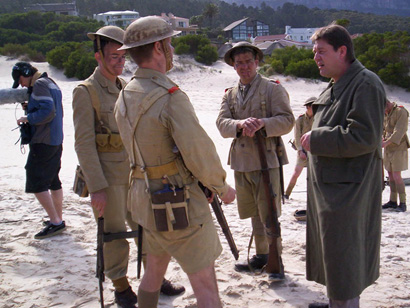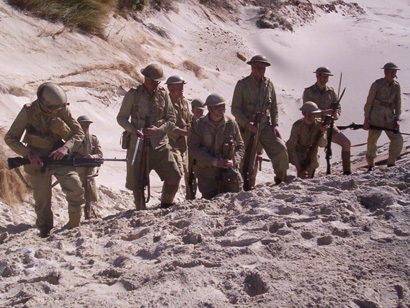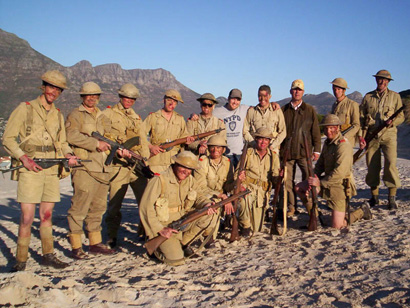By Jon Plowman
How do you turn your passion for film into a profit? How does one take all that experience built up on non-paying indie projects, and turn it into a career? I’m glad you asked. Welcome to the second part of a two-part article on indie filmmaking.
It seems to me that a lot of filmmakers are chronically losing sight of a very simple fact: there has been a total revolution in the film industry in the last few years. The last AFM – American Film Market showed some unsettling trends in the industry. The recession is biting hard, and it’s as much to blame as anything else, but unfortunately piracy is also taking a huge toll. Investors are much more wary of putting money into any given production, because it’s unlikely to turn a profit the way it used to five or ten years ago. The days when a filmmaker could command a budget in the tens of millions of dollars range are basically now a thing of the past, especially if that filmmaker is an unknown. The industry has slimmed down, it’s leaner and meaner and there is no space for egotistical filmmaking, for running way over budget and making huge, extravagant productions. The Avatars of this industry are going to be once in a blue moon in the future. And don’t think that you can make a film on a shoestring budget and have the slightest chance of selling it at AFM or Cannes, without having done your homework and made sure that it meets the minimum requirements for the industry. More of those in a moment.

Firstly, we need a network. Networking is critical. This industry coined the term “it’s not what you know, it’s who you know”, and that applies now more than ever. But indie filmmakers don’t have the cash to spend on cultivating the right people, so how can we make those crucial connections? Simple. Social networking. After a couple of years of networking via free social sites such as Facebook, I get about 90% of the work I do through the internet. I have a huge network of industry people, from actors, to directors, to producers, to production houses, to crew. Local and international people. None of that would have been possible without social networking. And even with nothing but handfuls of small change in my pocket, I can still afford to get online at a local internet cafe.
Secondly, we need a kick-ass script. Film is a visual storytelling medium, a way of presenting a story in a medium that is universal to people of all cultures, languages, ages and backgrounds. But without a story, there is no film. I run a group on Facebook which has nearly 200 members, almost all of them scriptwriters, many of them with great talent. Almost none of them have ever sold a script. It’s easy to find South African production houses who are keen to make the films, but there isn’t much local money here. We have a critical shortage of writing agents, so we are usually forced to try and sell our scripts overseas, where they tend to get lost in the crowd. So for us, it’s Catch 22. Again, social networking has helped to bridge that gap.

Thirdly, we need a good core production team, people who are prepared to do what it takes to nurse the project through to the finish line. No chancers, no laziness, no incompetence, but people who know their business, know the industry inside-out and are well connected. They don’t need to be experienced if they are good at what they do. And they need to know their own strengths and weaknesses and to be team players, able to delegate and share the workload with others whose own strengths can compensate. They need to be able to focus on the bigger picture, and work together to bring the production in, on time and on budget. It’s asking a lot, but those kinds of people are out there. Get to know them. Make it your business to know them, because without a good producer at the head of a good production team, a production – your film – is dead in the water.
Fourthly, we need a good business plan. Filmmaking is a business. It’s all very well to be creative, but at the end of the day, movies that don’t make money bankrupt the investors and lose potential investments for the future. Investors are people with money, and they made the money by being good at business. They need to know that the money they might invest is going to people with good business sense, who won’t waste the investment, but will make it turn a profit. So do your homework, and work out a proper business plan, complete with realistic projections of both sales and return on investment. Investigate the markets into which you plan to sell your finished film, find out whether or not it is a product that will have saleability, and get realistic estimates of the kind of income selling your film in that particular territory will generate. Critically, have a fully-fleshed out, workable marketing plan for the film, complete with marketing agreements with the right agents for taking the finished product off your hands to sell. Without those agreements in place before you ever greenlight the production, it’s virtually impossible to sell a film. They don’t need to be signed – frequently they can’t be until you know you have the other components of the production in place – but the fact that you have done your homework and have initial interest in your production can make all the difference when it comes to actually selling it.
Fifthly, we need Names attached. In the industry, a Name = money. Simple as that. Investors in the film industry only feel comfortable with their investment if they know we have someone with a reputation involved, someone who has already proven themselves. If the Name is not already internationally well-known, they need to be listed on IMDB and have a good portfolio and a good track record. Those are the only two viable options. Nothing else will do. And you’re going to hate me for saying this, but forget about making a cheap film with unknown cast, director, producer and writer. You simply won’t sell it. 99% of agents at the festivals won’t even take the time to discuss it further without someone that they can have confidence in attached.

Sixthly, we need the money. With a good script, a good business plan and a good Name, the money is out there and can be found. There are production companies with money – many of them international ones, and don’t feel that because your production is a local one, that you need to focus on trying to raise local money. There are private investors with the money to spend. And many countries have quasi-governmental or private organisations with the capital set aside specifically for local film production. Do your homework. With the right business plan and good connections, it’s perfectly possible to find the money you need in another country or even on another continent. I’ve been asked, “OK, fair enough, but what’s the right budget?” My answer to that is always, “How long is a piece of string?” The right budget is going to be different for every production, but it boils down to the usual mix of salaries, locations, crew, post production, etc, etc. On some productions, you might be spending as much as 50%, or more, on salaries. On others, the lion’s share might go into special effects. It’s going to be different for every film. Remember that anyone in the industry who has pull – your Name – will expect to be paid commensurate with that pull. But that doesn’t mean you can’t work out a deal whereby they get a percentage of the profits, and it doesn’t mean you’re going to have to pay $30 million just to have Brad Pitt in your film. You can find plenty of actors with similar box-office draw who will do the same or a better job at a fraction of the rate, especially if they believe in the project. Part of knowing what you need to spend is having a good producer who can give an accurate budget estimate, and who already knows where to shop to get the most cost effective savings with the money he’ll be given. And with the right budget, we can afford all the talented actors, crew, experience, locations, gear, etc that we need.
Get all those ingredients right, and from there on out, you can hang up your apron. No more flipping burgers for the rent and food, because you might just be able to make a career out of indie films.
Ted tells me he’s focusing on setting up the infrastructure to help support the indie film industry. With that infrastructure in place, it’s going to make the whole process of making and marketing films much easier. As indie filmmakers, we’ve done our time and proven ourselves. We’ve got the experience, the connections, the know-how. We’re perfectly set to take over where the bloated, hugely cost-ineffective mainstream studios can’t compete, and put ourselves on the map as the filmmakers of the 21st century.
About Jon:
Jon’s fairly typical of indie filmmakers in South Africa. He’s worked on more than 75 productions, everything from PSAs, student films and shorts, to commercials, television series and movies, and full-length internationally famous features such as Goodbye Bafana, Avenger and Blood Diamond. Last year he worked on the World War II film The Fallen, a short about South African soldiers’ contribution to the fighting in North Africa and which was a top 25 finalist in the International One Minute Film Festival. Since he lost his fulltime job, he’s been working on music videos and short films. He’s even been paid for some of them.
You can connect with Jon on Facebook: www.facebook.com/magscadar





